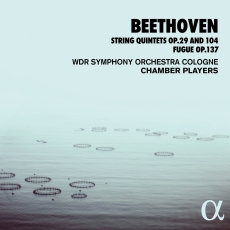WDR - Beethoven: String Quintets Op. 29 and 104, Fugue Op. 137 - Gramophone
It’s perhaps not surprising that Beethoven’s string quintets feature less highly in his output than do similar works by Mozart and Schubert in theirs. Of the three full-scale works, only one was conceived from the outset for the combination of string quartet with added viola (rather than cello, as per Schubert’s Quintet), and it is an early work, rather than a late one of depth and maturity.
Nevertheless, it’s a shame that Op 29 isn’t heard more. The enhanced instrumentation has the same effect that it had on Mozart and Schubert, granting Beethoven a broader canvas on which to create something more expansive and lyrical. It’s close in time to the Op 18 quartets but looks forward to the expressiveness of Op 59 – and perhaps even further ahead, to the sound worlds Mendelssohn and Brahms would create in their music for enlarged string groups.
Op 104, on the other hand, is an 1817 arrangement of one of Beethoven’s most popular early chamber works, the C minor Piano Trio from his first published set of 1795. Perhaps the transfer to the first violin of lines conceived for the piano’s right hand is not ultimately wholly convincing but this is nevertheless a viable alternative way of hearing this youthful work, refracted through the imaginative lens of a composer almost a quarter of a century older. These players from Cologne’s broadcasting orchestra do both works proud, capturing the warm sound world of Op 29’s opening movement and the scampering virtuosity of both finales. The encore is a kleine Fuge (1'49") – little more than a squib but a product of Beethoven’s late engagement with knotty counterpoint.

